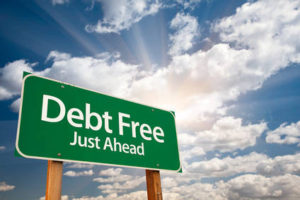How To Stay Motivated to Pay Off Your Debts After the Pandemic

Many Canadians have the goal to pay off their debts, and were probably working to achieve their goal when the pandemic hit, throwing a wrench in the works. However, once the pandemic is over, and life has somewhat returned to normal, it's important to get back on track, and stay motivated to continue paying off your debts.
Your debts aren't going to go away, and, if left unpaid, are only going to increase. However all too often, people lose their motivation to pay off their debts, and fall back into old habits with their money. We all know that financial plans can be difficult to stick with, especially when there are much better things you would rather be spending your money on, but managing your debt today will lead to a better financial future tomorrow. Many people do not understand that high debt will lower your credit score, therefore raising your interest rates. Getting rid of your debt will increase your credit score and give you access to the best interest rates when you want to make a big purchase such as a house or a car.
These are some ways to keep you motivated to pay off those debts after COVID-19, and for the rest of your life.
Stop hoping for a miracle to pay off your debts
Often, people who are consistently in debt mistakenly believe that righting their finances would take a money miracle. That's not the case. You can, and you will, pay off your debts, but it's going to take some hard work and sacrifices to make it happen. Two things that are not impossible.
Instead of waiting for a miracle, start trying to understand what got you into debt in the first place, and make a plan to get yourself out of it. You’re the one who is affected when you’re stuck in debt.
Understand what got you into debt in the first place
Sometimes Canadians get into debt through no fault of their own, and sometimes it's because of certain financial habits they have developed over the years. Without understand why you got into debt in the first place, you won't know what needs to be fixed to get your out of debt. If it was a bad financial investment, you've likely learned your lesson and will be much more cautious in the future. If your debt is due to your bad spending habits, that will be harder to fix.
Visualize and understand your debts
If you’ve ever taken a golf lesson, you will have likely heard the phrase, “keep your eye on the ball”. Just like in golf, if you fail to visualize your debt, it can hurt your ability to follow through.
The best way to put everything into perspective is to take time to lay out all of the debt you have owing into a spreadsheet or something similar. It's important to get an estimate of how much debt you have and how much it's costing you each year. This will help you decide which debts to focus on and prioritize. For example, if you see that you have a lot of credit-card debt on high interest credit cards, look into moving your balance to a card with a lower interest rate. Many cards offer balance transfers and lower introductory interest rates for new customers.
Above all else, don't stick your head in the sand and hope it all goes away. Getting hit with late and nonpayment fees, dealing with collections, and falling deeper into debt than you realized is dangerous, and simply perpetuates your bad behaviour.
Make, and stick to, a budget
Making and sticking to a budget is perhaps the most effective way to stay on track with your debt repayment plan. It’s important to be realistic in your budgeting, but make sure you challenge yourself. Be as strict as you can when it comes to spending your money. Read our 8 tips for successful budgeting, and How to live on a budget.
Ditch your bad habits
Habits are hard to break, that's why they are called habits. If bad spending habits have got you into debt, you're going to have to work hard to change those habits to not only stop yourself getting further into debt, but to free up as much cash as you can in order to pay down your existing debts.
- Stop impulse buying . Because impulse shopping is unplanned, you probably don't have the funds to cover the cost of it so use your credit card to buy it. That means you’re using credit to purchase items you can’t afford. If the item isn't in your budget, you don't buy it, simple as that.
- Remind yourself that it's not important to keep up with the Jones'. When a friend purchases a new vehicle or home, takes a pricey vacation, or wears expensive clothes, it can trigger competitive behaviour that leads to poor spending decisions. When these feelings emerge, remind yourself of your priorities and goals. While their success might be visible from the outside, your success is happening behind the scenes and within yourself. While their goal might be a bigger house, yours is to be debt-free. Keep your eyes on the end-goal.
- Never shop in a bad mood. Just like never grocery shopping when you're hungry, if you go out shopping to "cheer yourself up" you're going to end up spending far more money than you want to, hoping to boost a bad mood.
Find ways to save money to put towards your debts
As already mentioned, paying down your debt means freeing up some cash from other places to put towards your debt. If you really put your mind to it, you can cut expenses in almost every area of your life. For example, do you have two cars in your household? Do you really need both cars on the road (and really think about it - yes, having two cars probably makes life easier, but could you manage with just one? Could one parent give the other a ride to work and pick them up? etc.) If you could actually get away with only one car, take one off the road for 6 months. Think about the savings you'll make in insurance and gas that can go towards debt repayment. You might even decide that you can live permanently with only one vehicle and sell the second car, putting a nice lump sum towards your debt. Check out this blog post for more expenses you can cut down on right now.
Track and manage your debt
It's important to get into the habit of tracking your spending behavior. The more you track, the more you will be aware of how your spending habits affect your financial situation. If you don't track your spending, you won't know where it all goes. If you do track it, you can evaluate whether those purchases are worth it — and come up with ways to minimize or get rid of them.
Picture the light at the end of the tunnel
We've talked about the importance of visualizing your debt, but it's important to visualize your success as well. A life without debt is a life worth fighting for. When you lose sight of what you're fighting for, it becomes impossible to stay on track to reach your goals. A strategy that has helped many people stay strong is including milestone rewards. For example, plan a reward for when you reach the halfway point to your goal. These types of motivations act as great encouragement to continue to stay the course.
********
Refresh Financial's credit builder loan can boost your credit score and put savings into your bank account to help you pay off your debt.






Leave a Reply